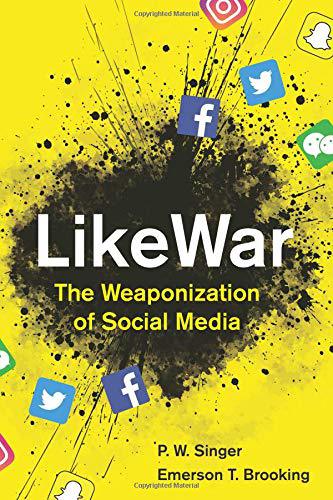
LikeWar
The Weaponization of Social Media
کتاب های مرتبط
- اطلاعات
- نقد و بررسی
- دیدگاه کاربران
نقد و بررسی

July 15, 2018
In which Facebook becomes a Clausewitz-ian continuation of war by other means.Ever since the 2016 presidential campaign, it has dawned on many Americans that social media might just not be our friends--and certainly not the friends of democracy. As Singer (Wired for War: The Robotics Revolution and Conflict in the 21st Century, 2009) and Brooking caution, though that campaign represents a historic use of social media on the part of the Trump machine to rebrand their candidate, "it was also a globe-spanning information conflict, fought by hundreds of millions of people across dozens of social media platforms." Those platforms are novel and not well-understood, but they are most definitely what military planners call "battlespaces." The Islamic State group has used social media to recruit jihadis from across the world; Russia, as we are increasingly learning, has deftly used those media to influence elections; kidnappers in places like Colombia and Mexico use them to select targets, harvesting information on habits and whereabouts. Some of the text is unnecessarily obvious; few readers will not know, for instance, that the internet has grown explosively in the last generation, as the authors patiently explain. But much is novel: Singer and Brooking sagely note the intensity of interpersonal squabbling online as a moral equivalent of actual combat, and they also discuss how "humans as a species are uniquely ill-equipped to handle both the instantaneity and the immensity of information that defines the social media age." The United States seems especially ill-suited, since in the Wild West of the internet, our libertarian tendencies have led us to resist what other nations have put in place, including public notices when external disinformation campaigns are uncovered and "legal action to limit the effect of poisonous super-spreaders." Information literacy, by this account, becomes a "national security imperative," one in which the U.S. is badly lagging and indeed serves as a negative example for the rest of the world.A timely, urgent look at a world of electronic sheep--and wolves aplenty, too.
COPYRIGHT(2018) Kirkus Reviews, ALL RIGHTS RESERVED.

August 27, 2018
Social media is not just a rancorous gabfest but a literal “battlefield... with real-world consequences,” according to this overwrought jeremiad. Singer (coauthor of Ghost Fleet), a contributing editor for Popular Science, and Brooking, a former research fellow at the Council on Foreign Relations, rehash alarming internet phenomena, including the Islamic State’s use of social media to recruit followers and post beheading videos, the Russian government’s exploitation of social media to manipulate American politics, and the white nationalist movement’s dissemination of pernicious ideas. The authors’ survey is wide-ranging, but doesn’t really support their argument that “online information itself a kind of weapon” posing dire threats to democracy. Their scattershot brief bundles serious issues, like the Chinese government’s arrests of online dissidents, with trivialities like the “memetic warfare” of Pepe the Frog cartoons; mostly their evidence just illustrates the banal truth that, like every communications technology, social media is used to spread propaganda. Worse, the authors’ militarized rhetoric underpins their calls for “legal action to limit the effects of poisonous super-spreaders” and for companies like Facebook, Twitter, and YouTube to “police” the “dangerous speech” on their platforms and act as “the arbiters of truth.” Readers who value free speech may be dismayed at the authors’ conflation of words with warfare. Agent: Dan Mandel, Greenburger Assoc.

October 15, 2018
This timely work provides a fascinating and often frightening portrait of the many ways social media is being weaponized and used to manipulate. Singer (Wired for War) and Brooking, a former research fellow at the Council on Foreign Relations, present a historical overview of the Internet and trace how social media has been implemented to terrorize and control and to reshape war. They provide specific examples of groups and countries taking advantage of online platforms, from radicalization by ISIS to disinformation campaigns and information throttling conducted by Russia, China, and North Korea, including extensive coverage of the 2016 U.S. presidential election. The authors also clearly explain how these campaigns succeed, with in-depth descriptions of the echo chambers and confirmation bias that dominate media and reinforce the goals of this war: dismiss, distort, distract, dismay, and ultimately divide. The last chapter expands upon the culpability and role of those controlling the platforms. This book is extremely well documented. Librarians will be especially heartened by the authors' assertion that "information literacy is no longer merely an education issue but a national security imperative." VERDICT An important first purchase for all collections.--Theresa Muraski, Univ. of Wisconsin-Stevens Point Lib.
Copyright 2018 Library Journal, LLC Used with permission.

























دیدگاه کاربران